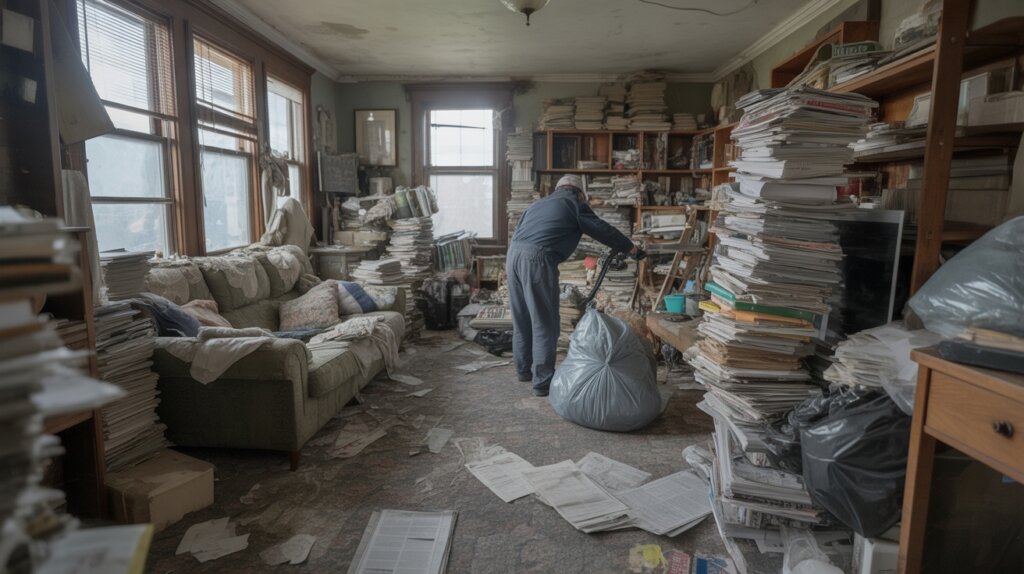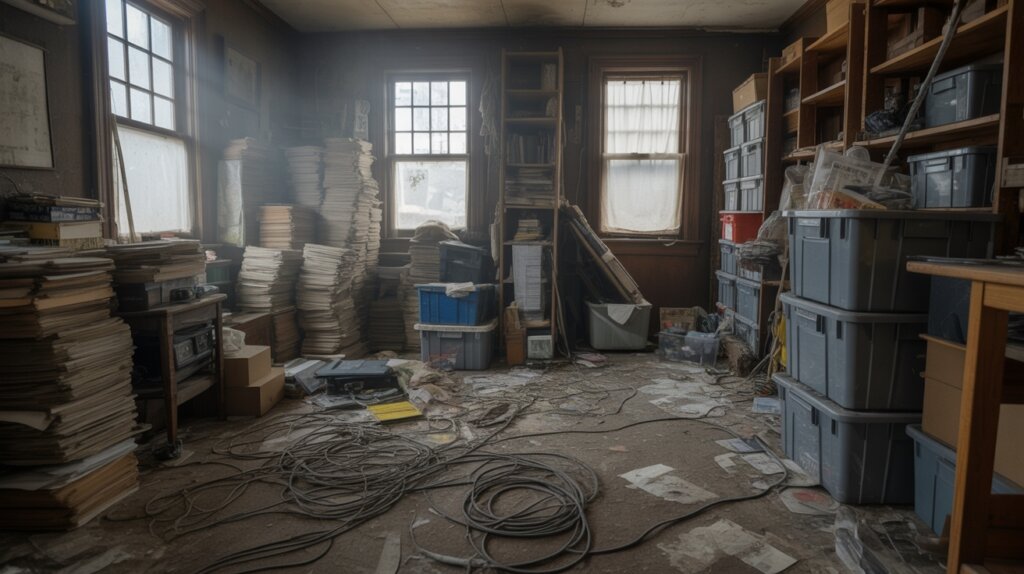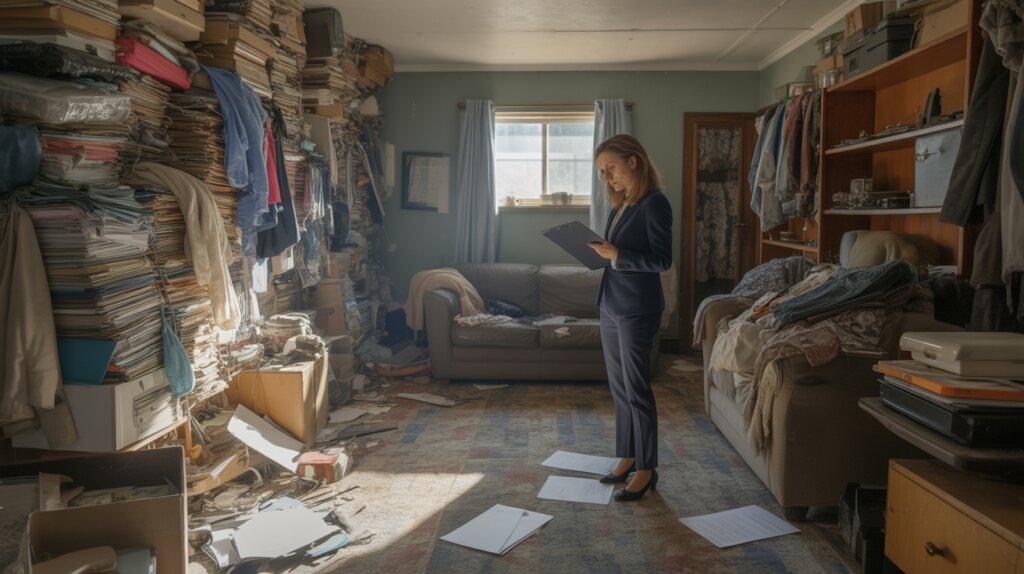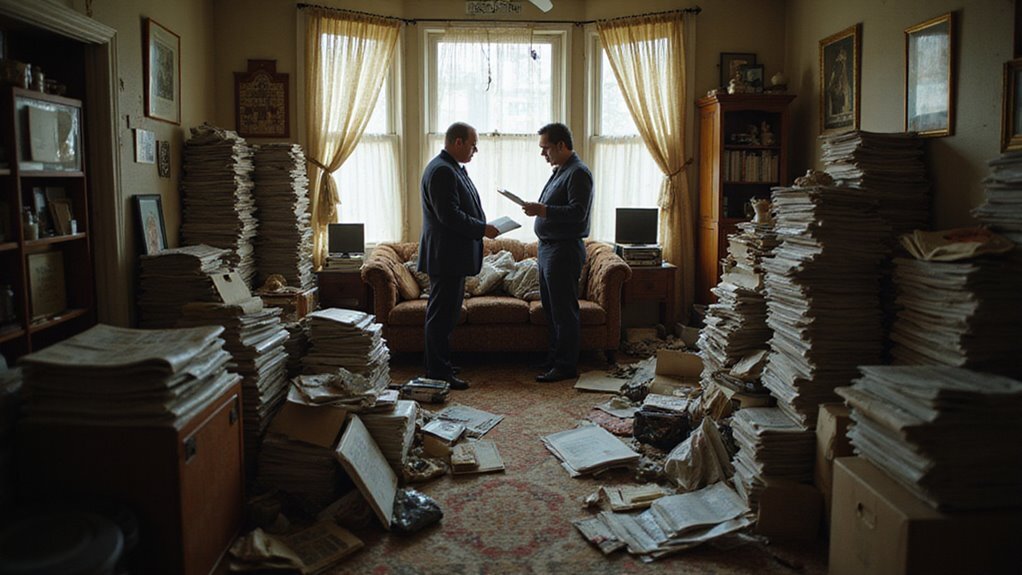Selling a hoarder home comes with serious legal issues. Owners often face complicated rules about what must be disclosed and how the property should be handled. Missing these details can lead to big problems.
Buyers and agents can sue if you hide the home’s true condition. Code violations or hazardous materials can also cause costly delays or fines.
The whole process can quickly become overwhelming and stressful. You must follow all legal steps, disclose everything, and fix issues to sell a hoarder home safely and smoothly.
This means knowing the rules, preparing good paperwork, and working with experts if needed. This blog will guide you through the legal steps so you can sell your hoarder home without problems.
Key Takeaways
- Sellers must fully disclose known hazards like mold, pests, or structural issues to avoid legal liability.
- Address municipal code violations, obtain necessary permits, and resolve hazardous waste issues before listing the property.
- Use licensed professionals for remediation and document all repairs, inspections, and cleanup activities for legal protection.
- Conduct a title search to identify and resolve all liens, fines, or judgments that could delay or complicate the sale.
- Ensure compliance with fair housing laws by treating all buyers equally and using neutral, non-discriminatory language in listings.
Understanding Local Property Disclosure Laws

Local property disclosure laws require you to share important information about your home when selling. Sellers must tell buyers about any serious problems, like mold or pests. If you hide these issues, you could face legal trouble.
Disclosure rules are not optional. You should check your state’s forms and talk to a real estate lawyer for help. A lawyer can explain exactly what you need to report. Disclosure rules must be followed—review your state’s forms and consult a real estate lawyer to know exactly what you need to disclose.
You should also look at your liability insurance policy. Some insurance plans do not cover problems you did not disclose. If you are unsure, ask your insurance agent for details.
Being aware of disclosure requirements helps you comply with legal obligations and reduces the risk of future disputes. Understanding the probate process and key requirements also ensures you meet all necessary legal steps when selling a property under probate. If you follow these rules, you protect yourself from lawsuits. Honest disclosure also builds trust with buyers. This can make the selling process smoother and safer for everyone.
Identifying Required Repairs and Remediation
You’ll need to assess the property for health and safety hazards, such as mold, pests, or structural damage, before listing it for sale. Make sure you address any code compliance issues that could block a successful transaction or lead to legal trouble later. Don’t overlook environmental cleanup standards, as these may require professional remediation to meet legal obligations and protect future occupants.
Additionally, addressing structural or electrical problems is crucial to ensure the home complies with safety regulations and minimizes liability risks. Conducting thorough inspections and documenting findings can help prevent future disputes and ensure all hazards are properly managed in accordance with local safety regulations.
Health and Safety Hazards
A hoarder home often has serious health and safety hazards. These hazards can affect buyers, contractors, and inspectors. It is important to find and fix these problems before selling.
Mold and mildew can grow in moist, cluttered areas. Mold can cause breathing problems and other health issues. If you find mold, you should remove it right away.
Pests like insects and rodents often live in cluttered homes. These pests can spread diseases and damage the property. You should call a pest control service if you see signs of pests.
Heavy piles of items can damage floors, walls, or ceilings. Structural damage can make the home unsafe for anyone inside. If you notice sagging floors or cracks, you should get a professional inspection.
Blocked exits are another danger in hoarder homes. Cluttered hallways can slow down escape in case of fire. Always clear main pathways to allow quick and safe exits.
If you address these issues, you make the home safer for everyone. Taking these steps can also help you sell the home faster. Proper cleanup is important for a healthy living space.
Code Compliance Issues
Local building codes require homes to meet habitability standards. Hoarder homes often have code compliance issues that must be fixed before selling. If you ignore these rules, you may face fines or legal problems.
Buyers and sellers should look for structural damage, blocked exits, or unsafe wiring and plumbing. Hazardous waste, like chemicals or biological material, can also cause code violations. Municipal inspectors may issue reports listing needed repairs.
A licensed contractor or home inspector can help find and document code violations. Their reports will estimate how much repairs will cost. If you resolve these issues early, the sale process will be easier and safer.
Environmental Cleanup Standards
Environmental cleanup standards are rules you must follow before selling a hoarder home. These rules protect people and the environment from harm. If you do not follow them, you could face legal trouble or a lower sale price.
A full inspection helps find dangerous items like mold, asbestos, or chemicals. Hazardous materials must be removed by trained workers. Proper removal keeps everyone safe and follows the law.
You should keep records of all cleaning and waste removal. Clear records help you prove you followed the rules if someone asks. If you need permits or papers, get them before listing the home.
Meeting these standards protects your investment and makes the sale process smoother. Buyers feel safer when they see proof of cleanup. Following the rules also shows you are a responsible seller.
Addressing Municipal Code Violations
You need to identify any existing municipal code violations, as these often carry significant penalties and fines that can delay or derail a sale. It’s essential to address issues such as improper waste disposal, structural hazards, or pest infestations before listing the property.
By proactively remediating violations, you reduce legal risks and make your home more attractive to buyers. Additionally, ensuring compliance with local property maintenance codes can help prevent future issues that could impact the safety and value of your home.
Identifying Existing Code Violations
Identifying code violations is important before selling a hoarder home. These violations can lower your property value and cause legal trouble. A careful inspection helps you avoid these problems.
You should ask the city for recent inspection reports. If there are any issues found by the city, these will be listed in the reports. Missing this step can lead to surprises later.
Review the local housing codes for your property type. Every city may have different rules for sanitation, fire safety, and building structure. Knowing these rules lets you fix issues before selling.
It is helpful to hire a licensed home inspector. An inspector familiar with hoarder homes can spot hidden code violations. If you skip this, you may miss important problems.
Document everything you find during your inspection. Good records will make your owner disclosures accurate. If you do this, you can avoid delays when selling.
Potential Penalties and Fines
If you do not resolve municipal code violations before selling, you may face penalties and fines. These fines can grow quickly and become expensive. Unpaid fines can create liens that must be paid before you can close the sale.
Local officials usually start charging penalties once they find a violation. Fines often increase each day you do not fix the problem. You might also get extra charges for inspections or enforcement.
If you want to avoid these costs, check your local code rules and deadlines. Prompt action can stop fines from getting worse. Knowing the process can help you protect your money and avoid legal trouble.
Remediation Before Listing
Before you list a hoarder home, fix all municipal code violations first. This prevents legal problems and delays in selling. Municipalities can fine homes with too much clutter or unsafe conditions.
A full inspection will help you find problem areas. If you spot issues, hire the right contractors to fix them. You should also rent storage units for items you want to keep.
Use a clutter removal service to clear and clean the home. If you do these steps early, selling your home will be easier. These actions help you stay compliant and protect your interests.
Managing Health and Safety Hazards
You must identify and fix health and safety hazards before selling a hoarder home. Common hazards include mold, pests, structural problems, and biohazards. If you do not address these, you risk legal issues and reduced buyer interest.
Professional help is important for removing hazards. Certified experts should handle mold, pests, and structural repairs. If you skip this step, home staging and marketing will be limited.
Always disclose all known hazards to buyers. If you hide problems, you could face lawsuits or lose the sale. Managing risks early protects you and makes the home more attractive to buyers.
Navigating Environmental Regulations

Navigating environmental regulations means following rules about hazardous materials on the property. If you do not follow these rules, you could face fines or legal trouble. Always check which local, state, and federal laws apply before you sell.
A seller should look for any hazardous waste such as chemicals, batteries, or biohazards. If these items are found, you must get the correct permits before removing them. Only approved facilities should handle the disposal of these materials. Proper handling and disposal of hazardous waste removal are essential to ensure compliance with environmental standards.
You must keep records of all inspections, permits, and waste disposal activities. If you document everything, you will have proof of compliance. This process protects you from possible legal or financial problems. Proper documentation of hazardous waste disposal is essential to demonstrate compliance with environmental regulations.
Working With Professional Cleaners and Contractors
Hiring professional cleaners and contractors is important when selling a hoarder home. These experts can safely handle clutter and dangerous materials. If you use the right teams, the home will be safer and easier to sell. Properly managing mold and water damage is also crucial, as unchecked issues can compromise structural integrity and health. Choose companies with experience in hoarding situations.
You should check for certifications and ask for proof of insurance. Always request references to confirm they can manage biohazards or sensitive items. If the home has historic features, make sure contractors know the legal rules. They must follow special cleaning and disposal methods for these properties. Document all work for legal and safety records. Coordinating with your team helps meet health and safety laws.
This ensures that mold growth prevention and moisture control are addressed effectively. Additionally, understanding and complying with local property disposal regulations can prevent legal complications. This makes the home more attractive to buyers. It also lowers your risk of problems during the sale.
Handling Structural and Pest Issues

You need to thoroughly assess the property for structural damage and hidden risks, as hoarding can compromise a home’s foundation and safety. It’s your legal responsibility to address any pest infestations and disclose them to potential buyers. Take prompt action to resolve these issues to avoid liability and ensure a more robust sale.
Additionally, inspecting for damage from rotting window frames can reveal further safety concerns that impact the home’s value and marketability. Conducting a comprehensive liens check can also help identify any legal claims against the property that might complicate the sale process.
Assessing Property Damage Risks
Assessing property damage risks is important before selling a hoarder home. Structural damage and pest issues can lower the home’s value. You should check for these problems early in the process.
Hazardous materials like mold, asbestos, or waste can create safety risks. Floors, walls, and foundations might have hidden damage due to hoarding. Pest infestations can also cause unseen harm, especially in less visible areas.
If you want a thorough assessment, start by looking for hazardous materials and write down what you find. You should then check the structure of the entire house. Concealed spaces need careful inspection for signs of pests.
Professional inspectors can help find problems you might miss. If you are unsure, always hire an expert. This will help you avoid future surprises and protect your investment.
Addressing Infestations Legally
Addressing infestations legally means following the law when dealing with pests and damage. You must fix pest problems and repair any property damage before selling. Local housing codes require these actions.
If tenants live in the home, you must respect their rights during repairs. Always give proper notice before entering for inspections or treatments. State laws decide how much notice is needed.
If tenants refuse access for repairs, keep careful records of all communication. You may need to start eviction if health or safety is at risk. Always check local rules and talk to a lawyer if you are unsure.
Handling infestations the right way protects buyers and limits your legal risks. Following the law helps you avoid future problems. Always review local ordinances before taking action.
Dealing With Zoning and Permitting Concerns
Zoning and permitting concerns can affect your ability to sell a hoarder home. Local rules may limit how you can use or change the property. If you do not follow these rules, you could face delays or legal problems. Reviewing local regulations early can help prevent unexpected issues. Check the property’s zoning classification to confirm its legal use. Look up past permits to see if any work was done without approval.
If you find issues, fix them before listing the home. Buyers may walk away if zoning or permit problems are not resolved. Local zoning officials can answer your questions and help you avoid surprises. Taking these steps early can make the sale process smoother. Additionally, understanding how zoning and permitting impact property use can help you make informed decisions and avoid costly mistakes.
Complying With Fair Housing Laws
To avoid violating the Fair Housing Act, treat every buyer equally. Do not consider race, color, religion, sex, national origin, disability, or family status. Offer the same opportunity to all interested buyers. Treat every buyer equally—never let personal characteristics influence your decisions or limit anyone’s opportunity to purchase your home.
When selling a hoarder home, use neutral words in your listing. Describe the condition honestly but do not add personal opinions. Avoid language that targets or excludes any group.
If you use an agent, confirm their knowledge of fair housing laws. Provide property details and access to every qualified buyer. Keep a record of all offers and communications.
Understanding legal protections helps you navigate compliance and avoid potential legal risks. Fair housing compliance protects you from legal risks. It also helps you reach more potential buyers. Being aware of discrimination laws ensures you act ethically and within legal boundaries throughout the selling process. Always act openly and fairly in every step of the sale.
Managing Liens and Outstanding Fines
If you want to sell a property, you must deal with any liens or unpaid fines first. These debts can delay or even stop your sale. If you resolve them early, you can avoid extra costs or legal trouble.
A title search will show all liens, fines, or judgments on your property. You should negotiate with creditors to settle debts or create payment plans. If you do this before closing, you will prevent problems.
Lien priority decides which debts must be paid first. If you know the order, you can avoid disputes at closing. Make sure to pay higher-priority liens to keep the sale on track.
Keep records of all payments and releases related to liens and fines. If anyone questions the process, you will have proof. Good documentation will protect you from future issues.
Considering Insurance Implications
You need to review your current insurance policy to determine if it covers risks specific to a hoarder home, such as property damage or liability issues. Don’t overlook potential gaps in coverage that could leave you exposed if an incident occurs before the sale. After cleanup, confirm the home’s insurability with your provider, as improved conditions may affect premiums or eligibility.
Assessing Existing Policy Coverage
You should review your homeowner’s insurance policy before selling a hoarder home. Many policies have limits when there is a lot of clutter or damage. This review helps you understand what is covered and what is not.
Your policy may not cover problems caused by neglect or poor maintenance. Some policies set low limits for damaged or thrown-away items. If the home has mold, pests, or hidden damage, there may be no coverage.
Liability coverage is also important. It protects you if someone gets hurt on your property. You should fix any insurance gaps before you list the home for sale.
Liability for Property Damage
Selling a hoarder home can make you responsible for property damage. If your home has harmed a neighbor’s home or public space, you could be liable. Property owners must check for any current or possible liabilities before selling.
Disputes may arise if clutter, pests, or building problems affect neighboring areas. Neighbors might file insurance claims or lawsuits if they suffer damages. You should review and document any known incidents, such as water or fire damage.
If you know about damage, report it to your insurer immediately. Always keep records of repairs and communications with affected neighbors. Taking these steps can help prevent future insurance problems.
The table below lists common risks and suggested actions:
| Risk Factor | Practical Action |
|---|---|
| Pest Infestation | Arrange professional removal |
| Water Damage | Repair and disclose |
| Fire Hazards | Remove any combustibles |
| Structural Issues | Get a professional inspection |
| Neighbor Complaints | Respond quickly and document |
If you address these risks before selling, you may avoid legal or insurance issues later.
Insurability After Cleanup
After a hoarder home is cleaned and repaired, getting insurance can still be difficult. Insurance companies may check the home’s history and past problems. They might charge higher rates or add special rules to the policy.
You should keep clear records of all cleaning and repairs. If you can show proof of professional work, it helps your case. Save all receipts and reports.
It is important to get a fresh inspection from an independent expert. This report can prove the home is safe and livable. Insurers may ask for these documents before offering coverage.
You should talk to different insurance brokers. Some companies are more open to unusual property histories. Comparing offers may help you find better terms.
Always read the policy details carefully. If you see limits or exclusions, ask questions. If possible, try to get wider coverage.
Protecting Yourself From Future Liability
Selling a hoarder home may lead to legal problems if you are not careful. You should take steps to protect yourself from future claims. Always make sure you follow these key actions.
An environmental assessment can uncover hidden dangers like mold or pests. You should hire a licensed professional for this inspection. This step can prevent surprises after the sale.
Full disclosure of any problems is important to avoid legal disputes later. Document all known issues in writing. If you hide defects, buyers may take legal action against you.
Buyers may have emotional reactions to the home’s history. Honest and clear communication can help build trust. If you are open, buyers are more likely to feel comfortable with the purchase.
Coordinating With Legal and Real Estate Professionals
Working with legal and real estate professionals is important when selling a hoarder home. They help you follow the law and protect your finances. Their guidance can prevent costly mistakes during the sale.
An attorney can handle title problems, probate issues, or property liens. If the house is inherited, legal help ensures you meet all requirements. Legal advice also helps you prepare documents and protect all heirs.
A real estate agent with experience in unique homes can give you a fair property value. Agents know how to market homes in poor condition. If you want a smooth sale, choose an agent who understands these challenges.
Request a formal property valuation to set the right price. Make sure all documents are checked by your legal advisor. If you follow these steps, you can sell the home with fewer problems.
Evaluating As-Is Sale Options
Selling a hoarder home as-is means you do not make repairs or clean up before listing. This option often results in a lower sale price. However, it can save you time and money on renovations.
If you need to sell quickly, an as-is sale may suit your needs. Investors or buyers wanting a project are more likely to purchase these homes. You should consider if a lower price meets your financial goals.
Emotional attachment can make this decision harder. If you or relatives feel connected to the home, selling as-is might be difficult. Think about your feelings before making a final choice.
Conclusion
If you plan to sell a hoarder home, you must understand the legal requirements. If you miss disclosures or repairs, you may face future problems. If you follow the law, you protect yourself and make the process easier for buyers.
If you want a simple sale, we buy houses for cash, no matter the condition. If you work with us, you avoid repairs and long waits. If you need help, our team guides you through every legal step.
If you are ready to sell, contact OC Real Estate today. We make selling your hoarder home fast and stress-free. If you want a fresh start, we are here for you.

